#Religious identity
Text
Dual faith folk witches
Polish Folk Witch (on instagram and Patreon) has an excellent article on dual faith practice and syncretism among folk witches: Dual Faith: the elephant in the room of the witchcraft community.
The topic of dual faith keeps returning on a regular basis in the broader witchcraft community online, especially on the intersection of folk magic, paganism and christian occultism.
Folk witches often…
View On WordPress
#diversity#dual faith#dual-faith practice#dvoeverie#folk Catholicism#folk witches#noteworthy posts#occult#Pagan#Polish folk witch#practice#religious identity#spirituality#syncretism#tradition#Wicca#witchcraft
52 notes
·
View notes
Text
India’s tribes demand recognition of their faith Mar. 27, 2024
India is home to around 100 million tribal people. Known by the umbrella term Adivasis, most of them reside in a handful of states in central and eastern India. They are nature worshippers and their faith is called Sarnaism. But it isn't recognized as one of India's major religions. Reporter Sushmita Pathak says Sarnaism supporters say that's unfair as they outnumber other faiths.
LISTEN 06:20 https://theworld.org/media/2024-03-27/india-s-tribes-demand-recognition-their-faith
0 notes
Text
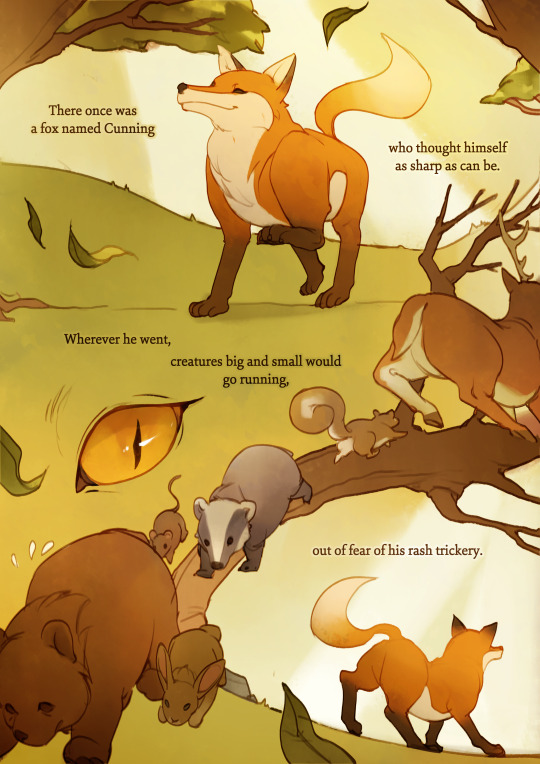
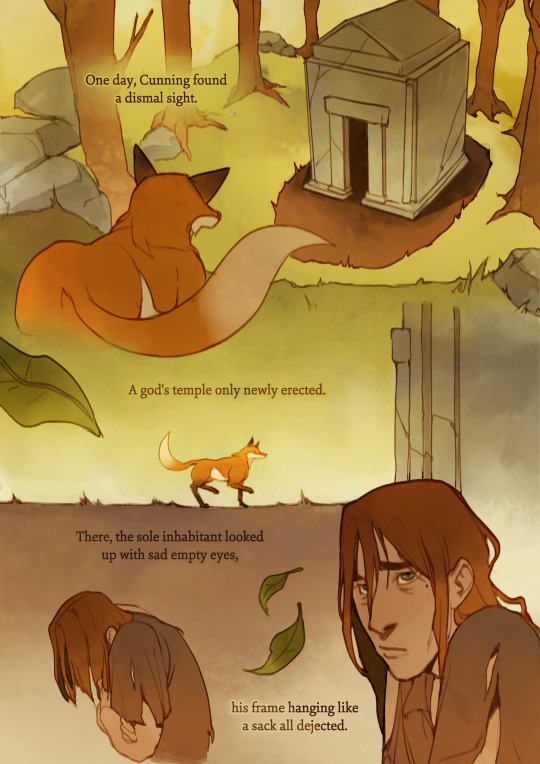
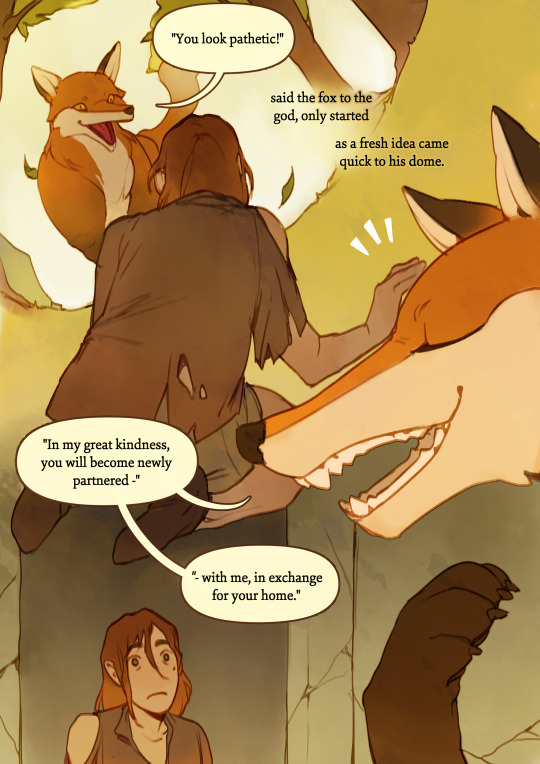
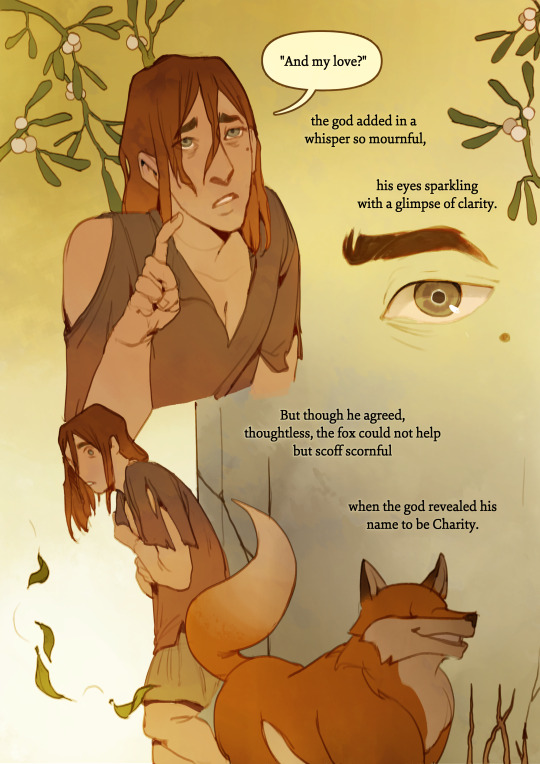

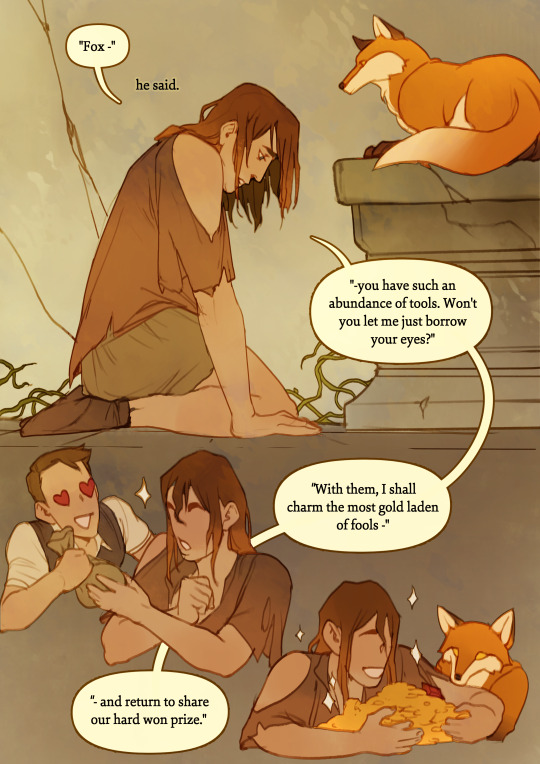
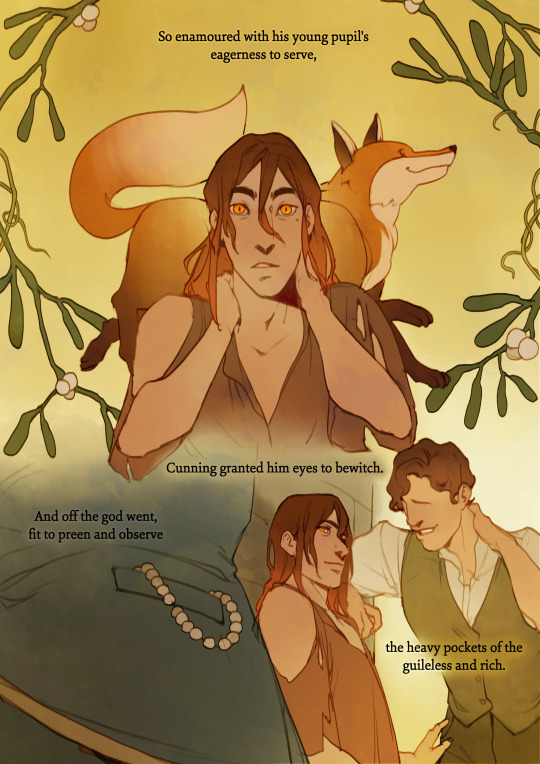
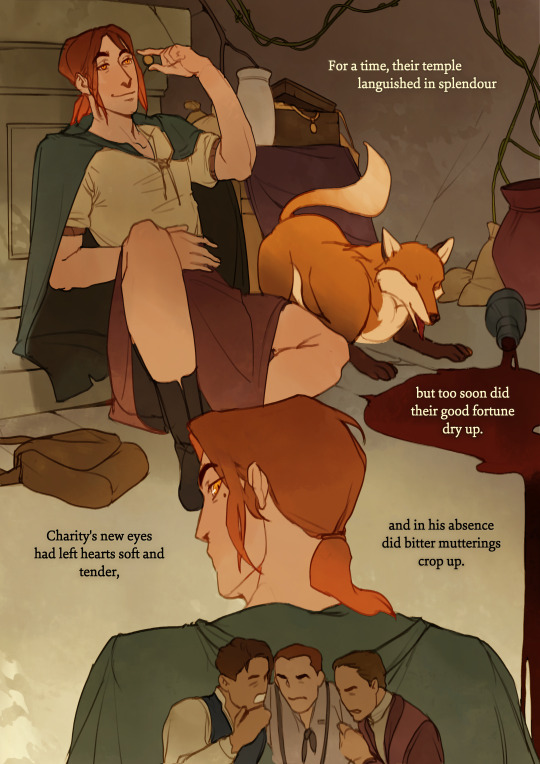
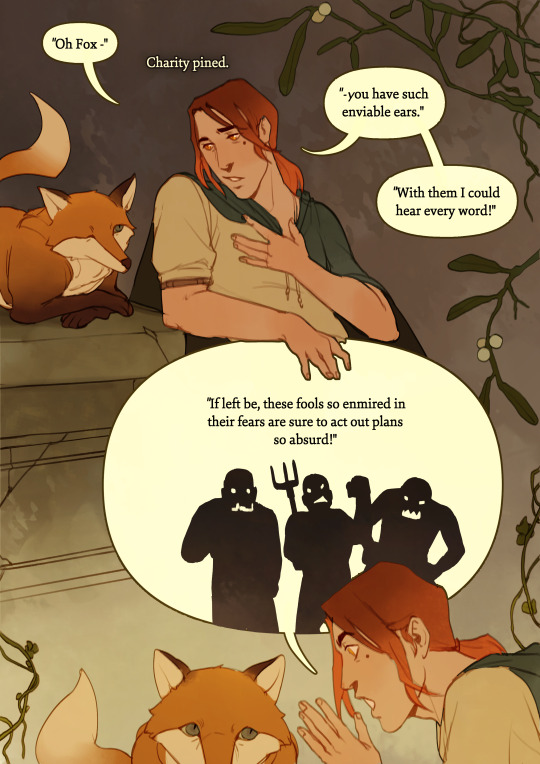
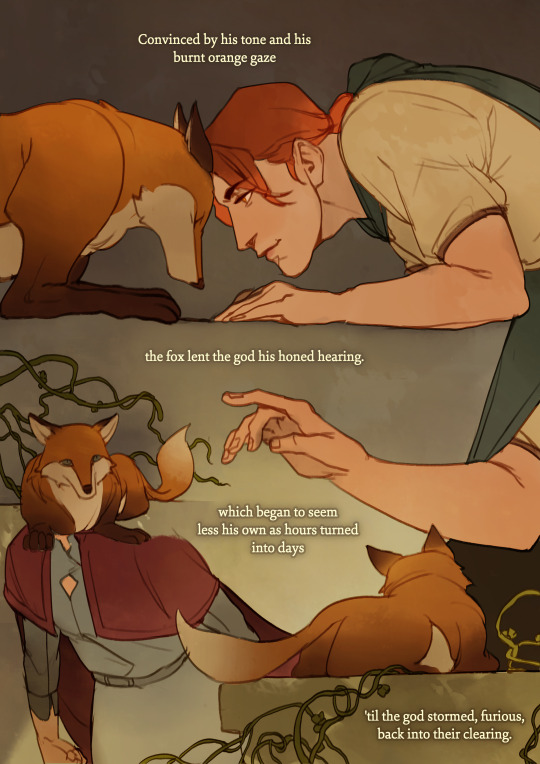
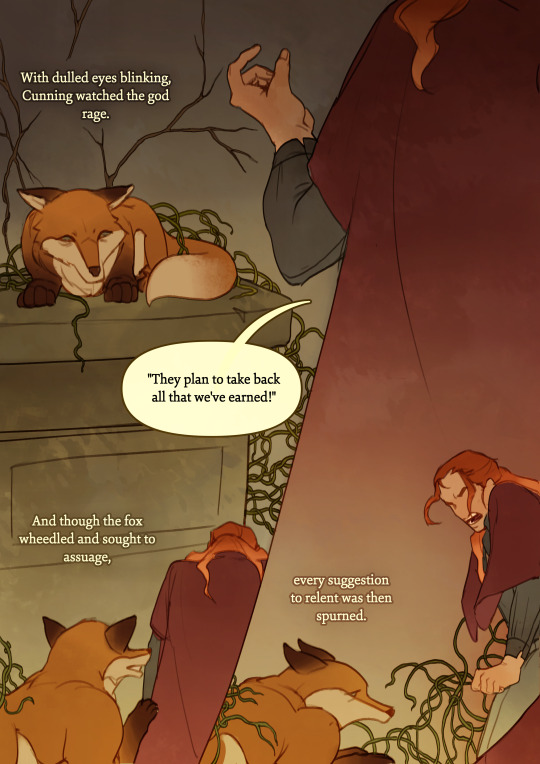
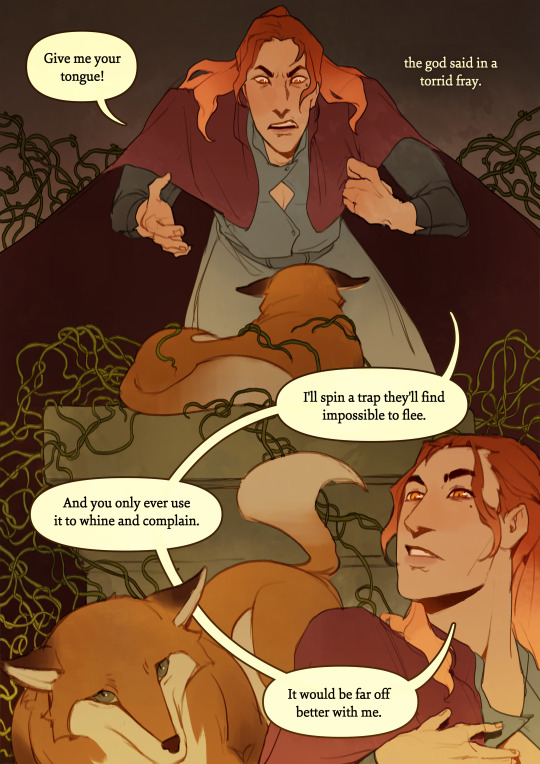
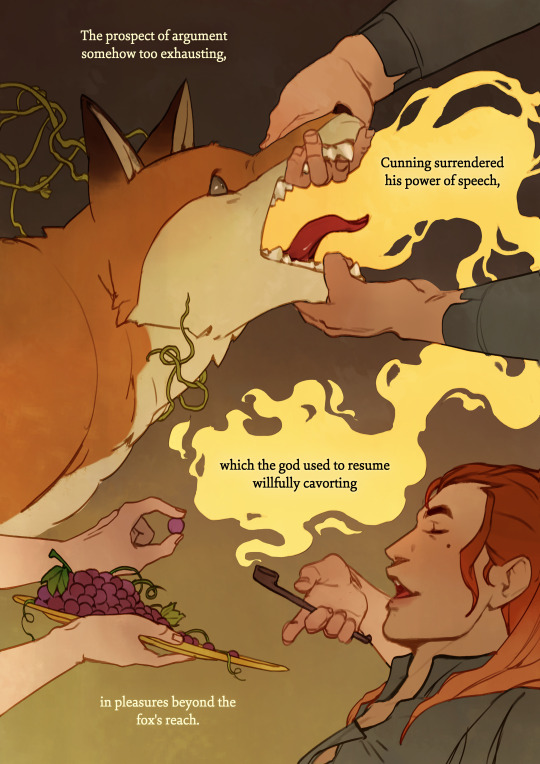
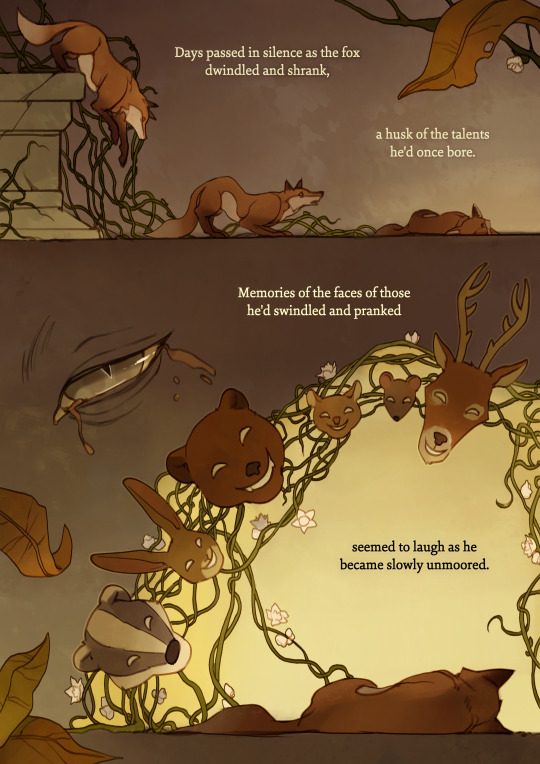
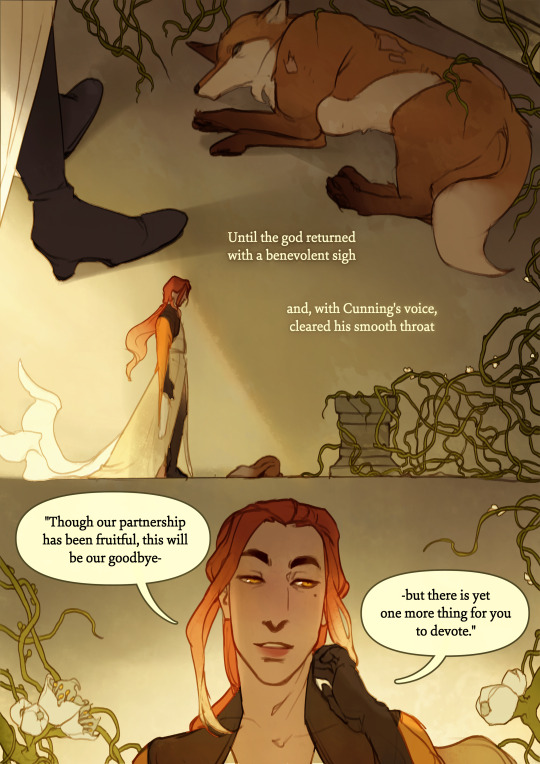
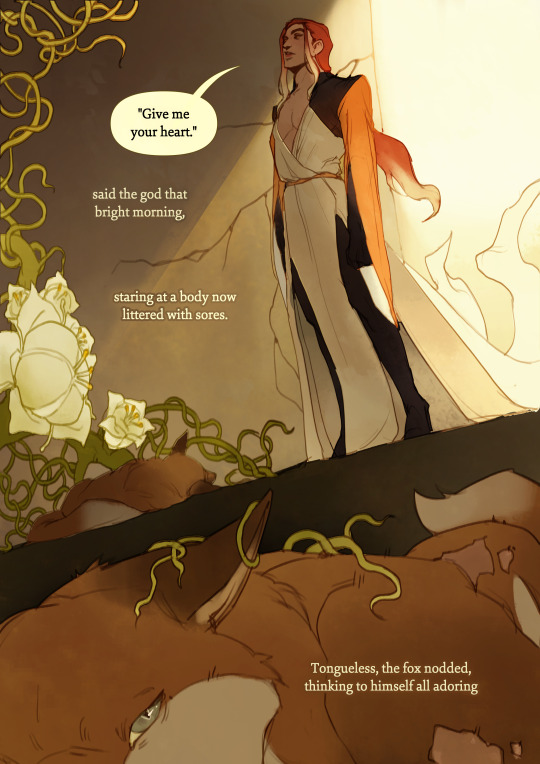
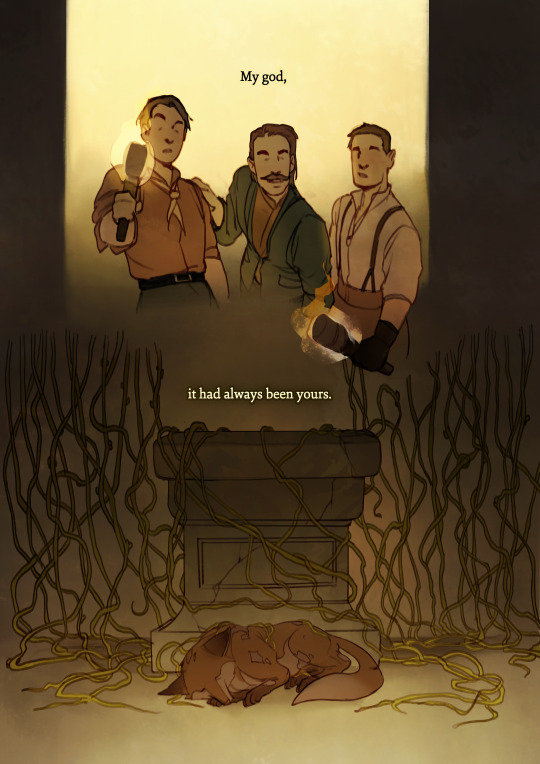
the fox god.
a comic about a trickster.
--
creative notes:
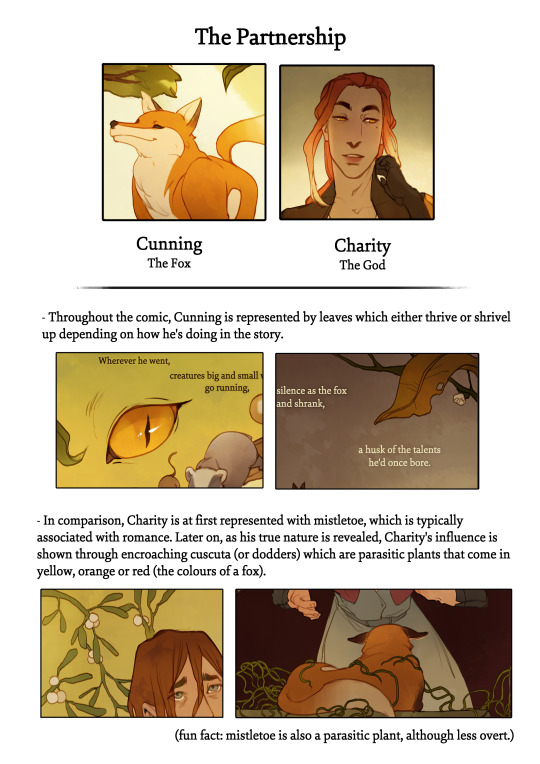

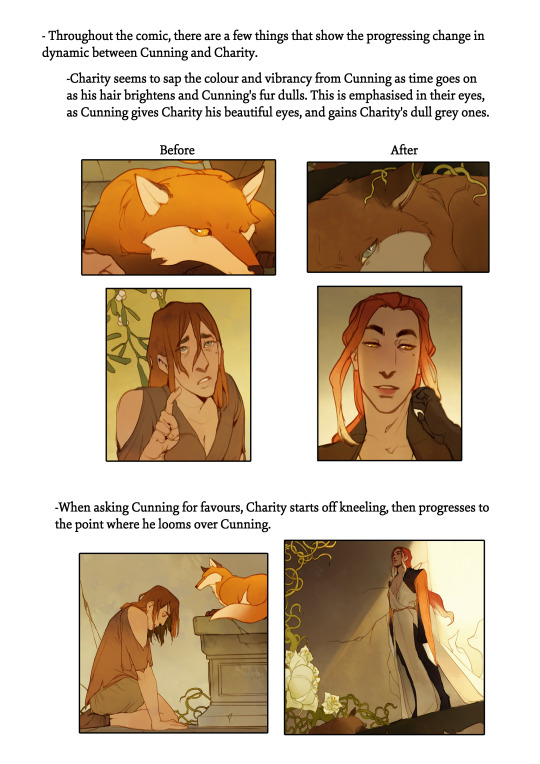
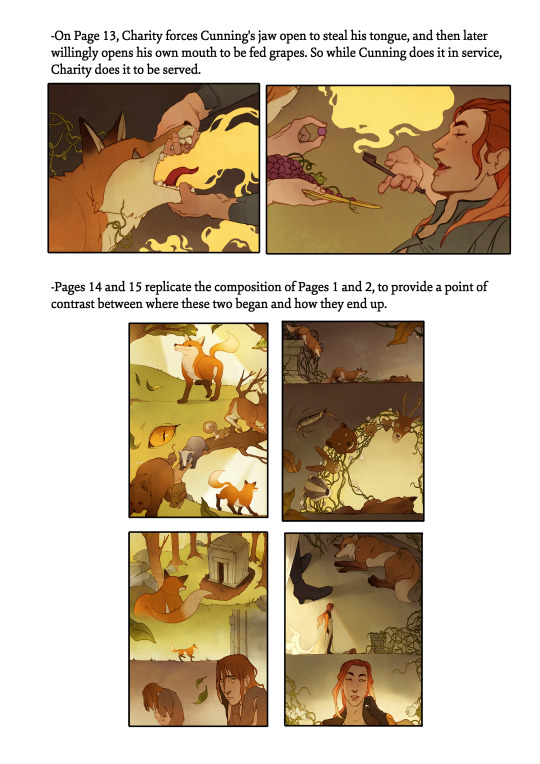
–
all my other comics
store
#cw: emotional abuse#cw: gaslighting#cw: animal death#charity - a god whose name was only ever meant to be ironic#i love playing with the concept of religion like this#im not religious at all but i did go to a christian school for twelve years#and i remember learning about the story of abraham. who long story short gets told by god to kill his son to prove his love for god.#and at the veeeery last minute god goes sike! this was a test to see if you'd do it! here's a lamb to slaughter instead#but the whole concept of that exchange in and of itself is so#anyway#one thing i meant to include in the creative notes but i ran out of room for is that charity never calls cunning by his name.#it's just “fox”. which was a small touch to indicate that he never acknowledged cunning's identity outside of being something exploitable.#but for all charity's hidden disdain for cunning#he still stole all his strengths and coveted them. he became known as the fox god.#so maybe some part of cunning survived. despite everything.#“give me your heart.”#“my god. it had always been yours.”#comic art#hearteaters#stillindigo art#stillindigo comics#one more comic to go until im finished with this collection!!
10K notes
·
View notes
Text
The funniest thought crossed my mind just now, to get participants on board from the most categorically obscure (lowest level of popular understanding) branches of international worshippers of Jesus Christ, and get twenty-year-olds from Tumblr to explain and defend the phrase 'culturally Christian' to the group.
0 notes
Text
yes asexuals can fuck but we need to not forget that allos can possibly not fuck ? entirely too many times I hear people saying "lol you're probably ace" to people that are literally just celibate . like guys . please . stop acting like the asexual = no sex i thought we were far past that guys
theres so many reasons to be celibate from religious to health (both physical and mental) and all the way to just not wanting to and it can very much have nothing to do with attraction
(not to mention it feels weird to see as a celibate aroallo but that's a separate topic)
#idk how to tag this#uh ace stuff ? hi asexuals#asexual#ace#aroace#acearo#alloace#aceallo#not gonna do non ace aro tags because this is not a very aro post except for the mention of me being aroallo#also mildly off topic does anyone know any forums about celibacy that arent like idfk christianswaitinguntilmarriage dot com#not that i have anything against religious celibacy but its very unrelatable to me#i kinda feel stupid celibacyposting but thats simply part of my like . identity
729 notes
·
View notes
Text
The first thing the intellect does with an object is to class it along with something else. But any object that is infinitely important to us and awakens our devotion feels to us also as if it must be sui generis and unique. Probably a crab would be filled with a sense of personal outrage if it could hear us class it without ado or apology as a crustacean, and thus dispose of it. “I am no such thing, it would say; I am MYSELF, MYSELF alone."
William James, The Varieties of Religious Experience: A Study in Human Nature
#quote#William James#psychology#James#human nature#The Varieties of Religious Experience#classification#individuality#philosophy#mind#intellect#identity
508 notes
·
View notes
Text
you know im thinking. im thinking maybe Yoichi wasn't even that into captain hero as an adult, but AfO kept bringing LITERALLY every conversation back to that because he decided to Be The Demon Lord and so Yoichi like, can't get an argument in unless he uses the same material so he's like 'oh my god i haven't even thought about that comic in ten years but even i know the bad guy didn't win. you should not be basing you whole identity, business model, and world destruction plan on your five-second impression of a comic book bad guy who didn't even win! also you shouldn't kill people!'
#AfO has a very flat picture of Yoichi in his head#His Possession. Weak and small. and taught him language reading and socialization with Captain Hero#he's THORS POPTARTS-ing his own brother in his memories#what sort of art styles did yoichi like? how did he interact with gender? did he like his eyes or did he wish they were different? was he a#morning person or a night person? were there clothing textures he loved or couldn't stand? did he like to collect feathers or leaves? did h#ever pick up any sense of religious knowledge from his assorted readings? cultural identity? did he learn how to cook in theory but never#had the materials to practice? or did he cook once they were older as AfO sort of internalized that as yoichi's subservient role?#or did he make absolute monstrosities when he attempted to bake anything?#We dont know because all we see of Yoichi is:#his brother's memories of him. could be flanderization for all we know#and an imprint of Yoichi in ofa#who by necessity has to be focused on his brother#we'll never get to see the whole picture of the dead holders. they're dead. and we can't change that. can't know their vibrant lives#so yeah lets see. a five+one fic about yoichi's changing relationship with media property captain hero over time in his life and death#compared to afo's static impression of yoichi's relationship / afo's own unchanging relationship with it#hmmmm
183 notes
·
View notes
Text
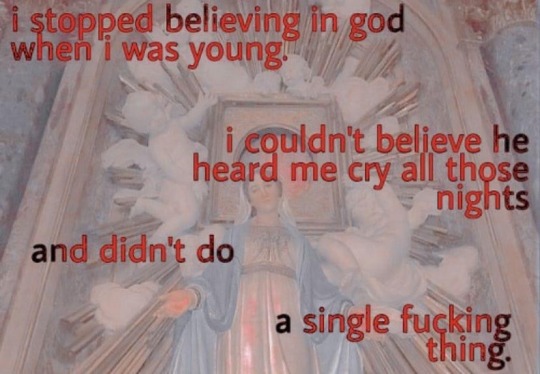
literally what the fuck
- Yang
#did#actually did#did stuff#trauma#dissociative identity disorder#did osdd#did system#religious#religious trauma#religion#atheist
2K notes
·
View notes
Note
If Machete and Vasco were roommates before they became a couple, there had to have been moments of innocent touching/body contact, followed by deep gay panic.
.
#I think the transition from platonic friends to a couple was very gradual the line was blurry#even if they weren't a proper serious item yet their relationship was definitely romantically tinted#by the time they rented that tiny attic room together#Vasco had figured out his orientation early on he was well past the identity crisis phase#Machete had mountains of religious trauma to work through so his road to self acceptance was rocky but he did reach it eventually#he guilt and shame and doubt kept resurfacing every now and then but the need for love and companionship was stronger#Vasco is naturally tactile and affectionate it doesn't take much to get an occasional hug or back pat or hand holding from him#and Machete had grown in a touch deprived bubble so as soon as he managed to overcome the initial fear and repulsion#he began to metamorphose into the lap dog he probably should've been all along#casual physical closeness was present even before things got lovey-dovey but that doesn't mean there weren't moments of gay panic#answered#skunkbomb
271 notes
·
View notes
Text
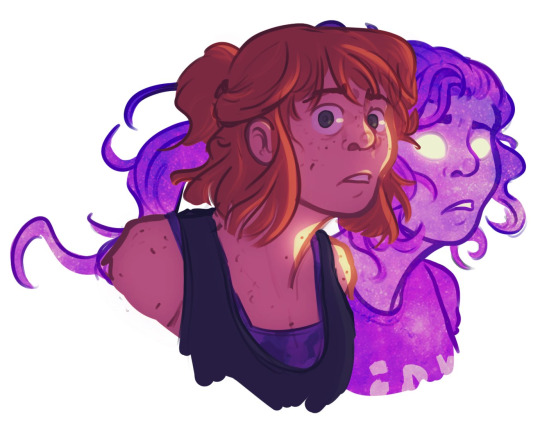
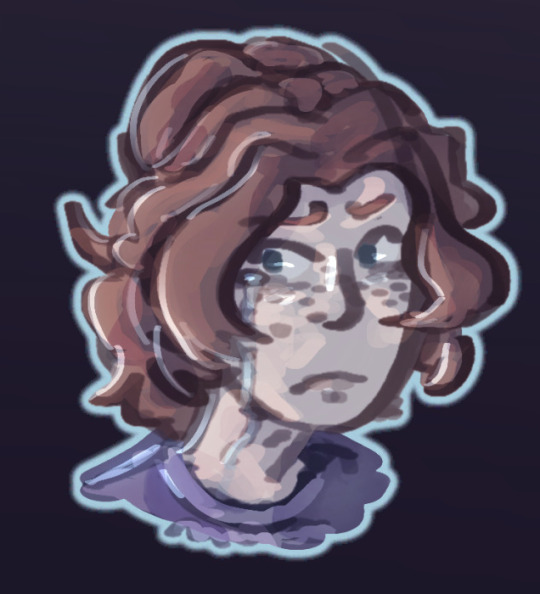
2024 vs 2021. kristen applebees you will always be everything to me
#mq arts#dimension 20#fantasy high#fhjy#kristen applebees#cassandra fantasy high#characters will have stories focused on doubt and self-identity and the nature of religious worship and expect me NOT to go insane <3
131 notes
·
View notes
Text
Anarchic Yule
Yule is a distinct festival, often overshadowed by its younger sibling, Christmas. If you’re a Pagan or have Pagan leanings, the chances are that everything you love about Christmas is actually because it’s a Yule thing. If you love the tree, the holly, the greenery being brought into the house, the feasting, and the reciprocity of thoughtful gift giving (as opposed to obligatory gift giving…
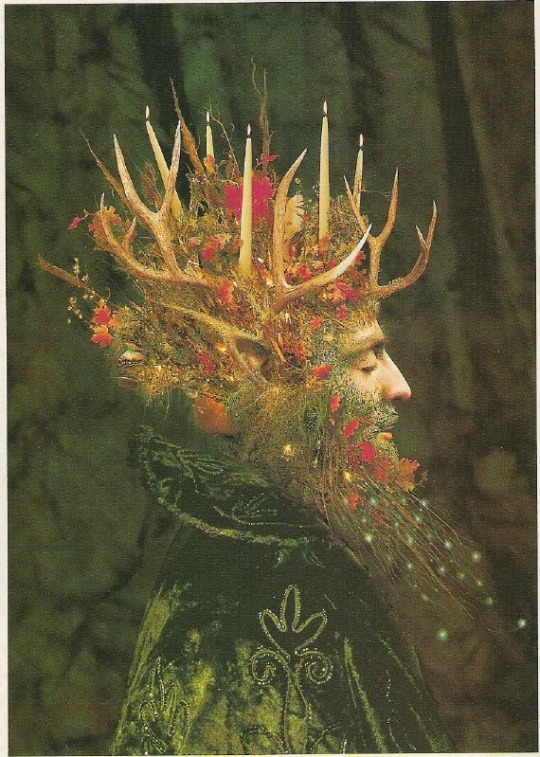
View On WordPress
#Cailleach#embodied spirituality#festivals#folklore#Gawain and the Green Knight#Krampus#magic#Nature#Old Father Frost#Pagan#Paganism#practice#religious identity#ritual#spirituality#stories#tradition#Wicca#witchcraft#Yule
23 notes
·
View notes
Text
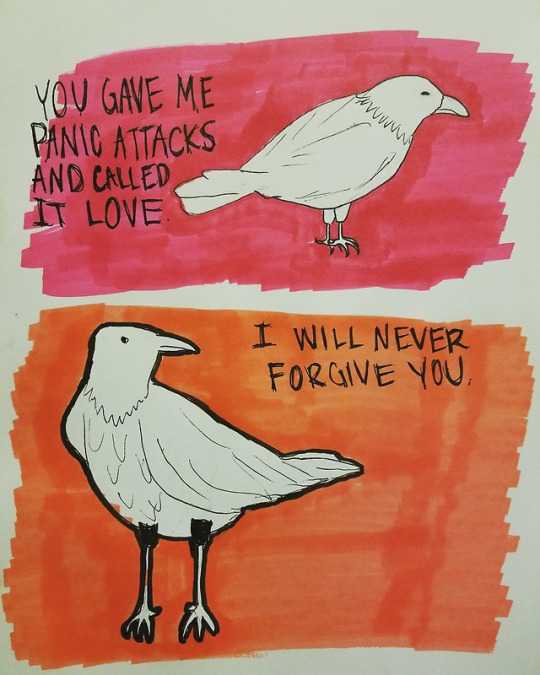
X
Blaine
#cptsd#actually traumagenic#dissociative identity disorder#actually ptsd#actually traumatized#post traumatic stress disorder#traumagenic system#actually did#ptsd#traumatized#religious trauma#domestic abuse#dv survivor#survivor#complex ptsd#tw ptsd#c ptsd#cptsd vent#traumacore#trauma survivor#trauma#abuse#tw abuse#anxiety#emotional abuse#blaine
106 notes
·
View notes
Text
Being religious and queer in the west is feeling more comfortable in religious spaces than you do in queer spaces, due to the culture of extremely hostile antitheism in the queer community, forcing you to abandon a major part of who you are to be welcome, meanwhile there is a growing culture of open and joyful acceptance of queerness within increasingly diverse religious spaces, allowing you to be your authentic self
#personcole#queer and religious#religious and queer#queer theology#lgbt antitheism#progressive religion#op belongs to reform Judaism and embraces their lgbt siblings of all religious identities
101 notes
·
View notes
Text

Not gonna get into danganronpa another spoilers because this whole scene is something else that I’m still processing but I absolutely love this line. Like to bring up milgram I think this is an idea which can reflect on lots of the characters as well. The idea of basing your entire existence off of a certain thing/person/ideology and then for something to happen that completely destroys that. Your entire person has been stripped away and just what’s left? You can’t comprehend your own existence or meaning without that specific attachment and you start to question all of your actions based off that…
I can only really think of John, Kotoko, and Es here (and possibly Amane and Mikoto to an extent). And John bases his life off of Mikoto, Kotoko upholding justice, and Es being the warden.
John’s idea of his whole existence and reason for being is Mikoto. It’s the only reason he believes he exists and if he were to fulfill his role he’d “disappear” as he would be completely worthless without him. John tries to repress and ignore his humanity and reduce himself as a tool to protect Mikoto and that’s all he can see himself as. But now Mikoto’s starting to not deny his existence and feels pure hatred for everything about him. And what will happen to John, when the person he’s dedicated his entire life to and desperately wants praise from, denies his existence? What will he be but some worthless existence that is only a burden, to him.
Kotoko. An ideology of upholding justice and punishing evil that has completely overtaken her. She has pushed herself into a role of a “fang” for justice, protecting the weak and persecuting evil. But even so matter how much she tries, she knows her goals are unreachable. She denies relationships and attachments to other people based on this ideology. Kotoko admits that she does feel attachment to the prisoners, but has to deny them in order to fulfill the role as a tool. And believes that pain and violence is necessary to achieving a greater good. Trying to deny any regret because wouldn’t it be easier to believe you’re entirely in the right? She latched onto Es, believing them to be similar as the warden who carries out judgement on wether the prisoners are forgivable or not. But now, Es has denied her whole ideology, her whole existence due to the pain she’s caused. Kotoko wants to believe that what she did was right and that Es, another enforcer of justice would accept her, because that’s how it is.
And Es… they’re the warden of the prison. There’s nothing more to them than that they believe. Es has no memories of their identity or past before Milgram and immediately latched onto the identity given to them, of being the guard. Es took this role as their entire identity, an extension of the milgram system in order to interrogate and judge prisoners. I think Muu put this best.
“Warden-san, we call you "warden" because that's what you are, right? And I was assigned the role of prisoner, but that doesn't mean I'm now nothing but a prisoner at heart, too. After all, I'm still me.”
Es has an unstable sense of identity, to the point they latched on to the first thing they were given in order to give themselves a purpose and a meaning for existence. And Kotoko calling them “imperfect caused them to question their identity. But as the story progresses Es will probably begin to learn about the audiences control and the truth behind what they assumed to be their verdicts. That their will never was 100% their own. Who knows what Es’ past was, but eventually they’ll likely have to tackle it and their whole identity, the warden, the arms of milgram, is gone.
gonna think about Mikoto and Amane here as well. Mikoto, although may not seem to be as first, focuses his entire identity around other people. He’s the friendly sociable guy who’s easy to chat with. But that’s all he believes he should be, I guess. As perhaps this mindset is upheld by an inherent fear of other people rejecting him, so he focuses all his attention and identity on being a social person. He’s never truly friends with people, as perhaps that would be “too close” and open up the possibility for danger. He doesn’t completely deny his identity like the others, but he molds and shapes it in a way that is acceptable to others. He likes what everyone else likes and does what everyone else does so the fear of being rejected for being different won’t hurt him. But now he’s stopped denying John’s existence and his DID, believing himself to be crazy, and to be completely rejected from other people, his entire sense of identity to an extent. And especially with John scaring other people off with the mindset that will help Mikoto, he has now been completely distanced from everyone else and now has to come to terms with himself, but not the ideal persona he put on to be acceptable to other people.
Amane is a more different case as she in a way has rejected that idea, but not completely. Growing up in a cult it’s very likely that she was always conditioned that she was just a servant for god. That all the good things she did were actually god blessing her and all the bad things a fault of her humanity, herself as a person. She is in a unstable relationship with the whole submitting her personhood to her religion, as she sacrificed her ideologies in order to help a cat. But at the core, that wasn’t about herself and her identity, rather a focus on the cat’s life. Amane’s murder was her will. Rejecting everything and fighting for her life in direct opposition to what she has been taught her entire life and how her identity should be, a rejection of that and a glance into “herself”. But once again, this murder wasn’t entirely self motivated. She’s still broken enough that she can’t fully grasp herself as a person besides god and religion. And a large cause of her murder was out of the death of the cat, rather than simply protecting herself. Amane still slips back into the belief that her personhood is entirely dedicated to god. As she tried to convince herself and Es that the only reason she killed is because they deserved religious punishment and she is in the right for carrying out god’s will, once again denying her personal reason for doing so. Reducing herself to “we” on behalf of her religion, that this isn’t herself anymore. Amane is in a limbo between rejecting her personhood for god, but at the same time rejecting the suffering she’s been through in order to save “herself”. Amane’s case is so interesting, as there’s no clear answer of what she believes in here, and it is truly fascinating.
#milgram#Milgram theory#milgram analysis#amane momose#mikoto kayano#john kayano#john milgram#kotoko yuzuriha#es milgram#uhhhh this was meant to be a quick analysis how did this turn into an exploration of the identities of 5 characters#And comparing it to a scene from dra which focused a lot around the loss of someone’s beliefs completely destroying their identity?#May analyse that scene directly because the whole philosophical and psychological concepts coming into play there is just soooo cool#and man I was kinda figuring out stuff as I was writing this but like I said it’s so interesting how Amane isn’t completely dedicated to go#Like the other characters I mentioned who have dedicated their whole identities to something#And Amane’s at the struggling between her true self and her perfect religious self#But perhaps she doesn’t entirely realise this conflict going on within#Which is interesting as a realisation of their identities would probably cause the other characters to lose it#But Amane it’s coming to her in a different way#She’s so strong uahhhahhajajshshshs#Tw cults#Ok now thinking about this more I’m starting to see this whole ideology apply to other dra characters as well#Man this is just so interesting#Like Kinji although having nowhere near as bad of a situation of amane was in a way forced to repress his emotions his entire life#Due to religious reasons and to devote his life to god and reject personhood#Surprisingly he’s actually not a bad person but still is very stoic and avoids other people due to being taught those values#And kinji’s a whole parallel to Tsurugi so this would be really interesting#I would talk about Tsurugi here but this is primarily a milgram post so for everything he’s like kotoko with a dedication to justice#But handles it in a very different way#His story is just way to long to analyse now#But hey this is an invitation to play (or watch bc downloading the game is hard technically) danganronpa another
24 notes
·
View notes
Note
Tell me about your onions.
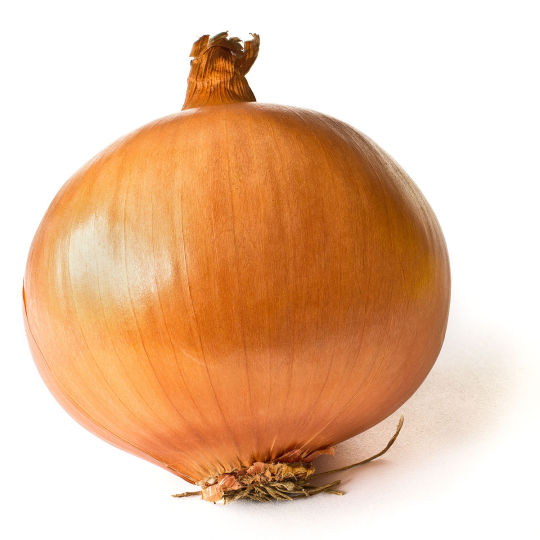
here's an onion. i'm so funny.
ahem.
ok real talk though i've been doing a couple brief dives into the reincarnation aspect of buddhism/hinduism, which haven't been super applicable to COTL so far. which is a shame, bc it has such an interesting take on rebirth and resurrection within the nature of religion.
in COTL, death is seen as semi-permanent and a boon. lamb uses it to their advantage via the nature of game protagonists being able to restart from a save point when they died. the ritual of resurrection is groundbreaking for followers, and i headcanon that the ritual of rebirth is the main reason why TOWW got imprisoned. it is very much a loaded gun in the COTL world.
but buddhism treats rebirth as not only a nature of living, but something that needs to be escaped from. literally something that one must fight to be unshackled from, to break past samsara and reach ascension via nirvana. it's such an interesting viewpoint to consider and explore, especially bc my interpretation of lamb has them never being willing to become this resurrecting figure in the first place. as much as the red crown has been a boon for them, it's also acted as a bind. they will always have both their mortal and godly vices.
in both hinduism and buddhism there are multiple schools of thought that tackle the continuuity of resurrection, aka "what is carried over when one is reborn?"
now suppose narinder did not carry everything he had as TOWW to his mortal form. what is lost, and what is gained?
if i were to adapt samsara into my cotl fics i'd focus less on actual death and more on metaphorical ones. which, ok bear with me here, is a huge part of my personal philosophy.
humans are not static; we grow and develop, and in doing so we shed prior versions of ourselves like metamorphosis. a sort of ego death lite, if you will. when faced with a traumatic event, the person you once were is not the same as the person you are now. that is the kind of metaphorical death i'm talking about; the death of a former self.
but what exactly marks the new self and the old self? nothing, theoretically. we can make the boundary as low or as high as we want.
consider the ship of theseus: if a huge portion of my body is replaced every 7 years, can i definitely say i am who i was 7 years ago? what part of identity and self stays constant, when my personality's changed drastically? am i a stranger with the memories of someone else?
now narrow the boundary. if the self is physically static, then every time a cell dies, the self dies.
using that technical definition, technically i die and am reborn every single second. a metaphorical death and a metaphorical rebirth, and what gets carried over?
something something life and death are two sides of the coin of change.
that's why i kinda keep emphasizing lamb's impostor syndrome crisis about themselves dying in both soul and body during the execution. that's why i divide narinder's life into such stark epochs (mortal, bishop, imprisoned, mortal again). that's why i love treating their afterlife not as a continuity of their character development, but a second chance. ship of theseus, broken down and rebuilt anew.
it's not nirvana. but it's making the best out of your own personal samsara.
and just. there's something so poetic about narinder and lamb reincarnating as gods of death, because the only way to die repeatedly is to live again after each one. a taste of permanence in the impermanent, without ever reaching that finality that they embody as gods. they represent the very thing they are and aren't. it's a paradox that makes perfect sense the moment you remove the black-and-white boundary of life/death that dictates they must be opposites.
and this is what i love exploring. breaking down the barriers of identity and death in the metaphysical sense, in two characters who are defined by so much loss in their lives. (metaphorical) death, treated as redemption, treated as healing.
lamb, offering a hand up to a newly reborn narinder. i died, i got up, and i live.
#my asks#for the record i am very firmly an atheist#i just find studying religious beliefs very fun and very interesting as an expression of the human condition#and also ship of theseus is a tasty thought experiment when applied to human identity#am i a bit cuckoo? absolutely.#:)#long post#long ass fuckin post that i don't expect anybody to read. if you did congrats you get to hear one of my core motivations for narilamb
29 notes
·
View notes
Text
As far as Polly could tell, Igors believed that the body was nothing more than a complicated kind of clothing. Oddly enough, that's what Nugganites thought, too.
Terry Pratchett, Monstrous Regiment
#polly perks#igor#the nugganites#monstrous regiment#discworld#terry pratchett#belief#body#identity#selfhood#science#scientism#religion#religious fundamentalism#similarities#a complicated kind of clothing#oddly enough
101 notes
·
View notes